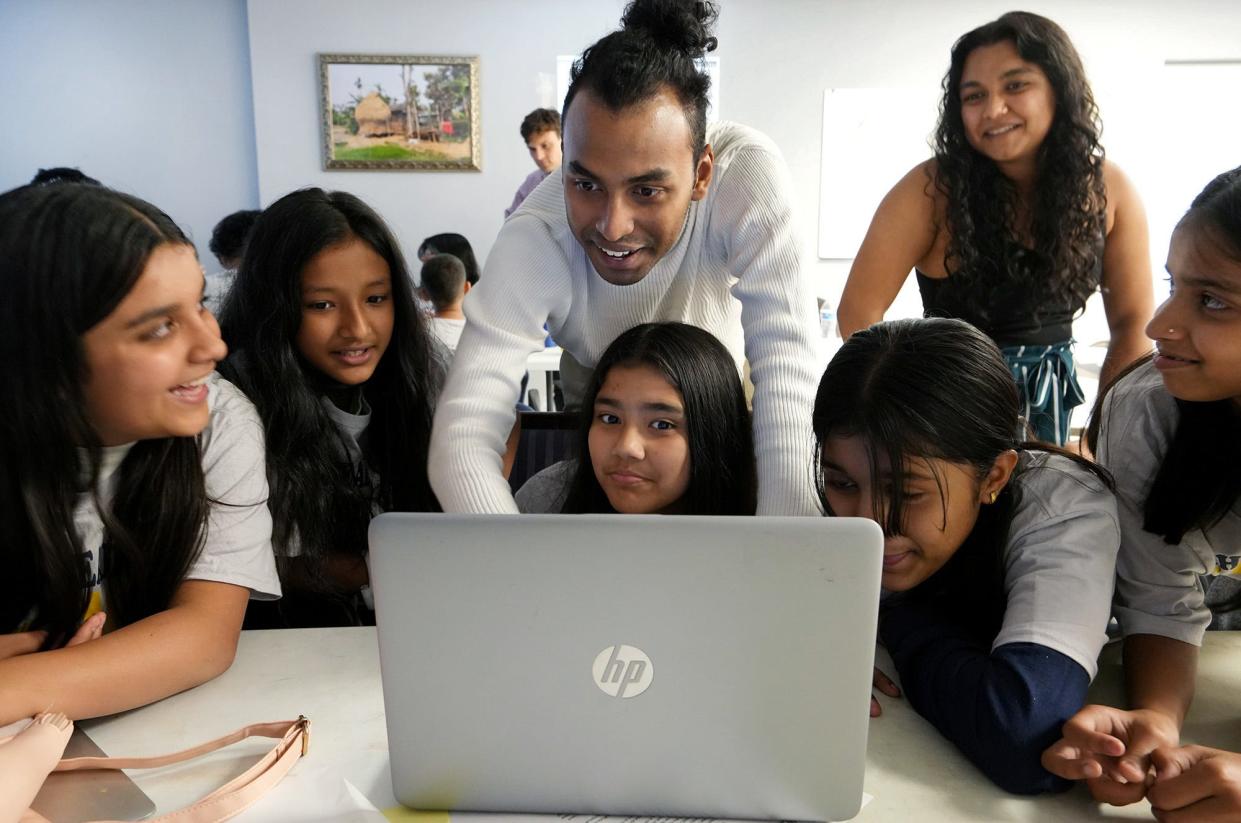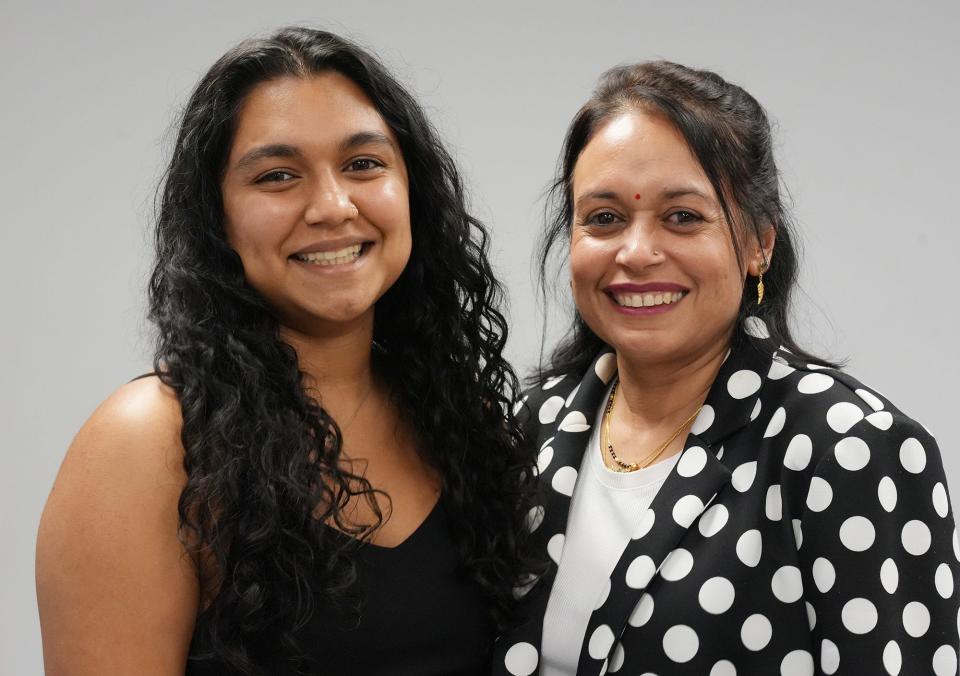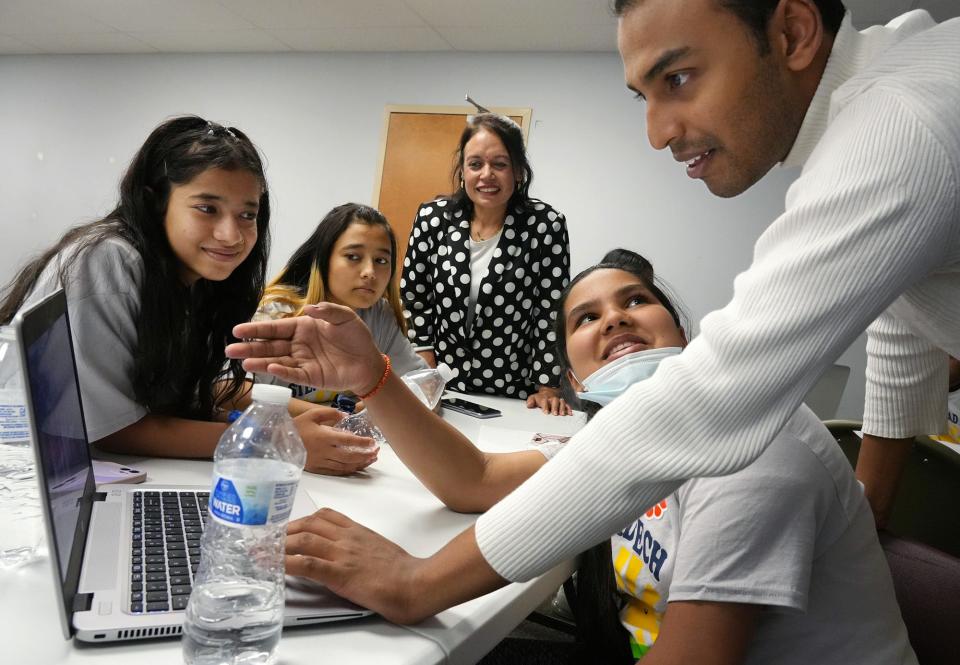'Leveling the playing field': Summer camp readies immigrants' kids for college, job market

A singer’s voice echoed from behind the door to a meeting room at an otherwise quiet Reynoldsburg office park recently.
Inside, a group of 20 Bhutanese-Nepali-American teenagers sat in front of laptops, listening to artist Rufus Sivaroshan explain how he mixes his music.
Sivaroshan, whose stage name is “a kid named rufus,” changed some settings on his computer and asked: “Did you hear that?”
“It sounds like you’re underwater,” marveled a sixth-grader with a long ponytail.
The kids were attending Step Ahead Tech, a free, volunteer-run summer camp for children of immigrants that is focused on STEM (science, technology, engineering and math) subjects and soft skills that will prepare them for the job market.
Step Ahead Tech: Most campers come from Bhutanese-Nepali community
The founders, Ashtha Singh, 20, and her mother, Sarala Pandey, 53, of Dublin, have hosted a total of around 80 young people since they began the camp in 2018. The kids, ranging in age from 12 to 18, primarily come from the Bhutanese-Nepali community, although there have been Somalis and other immigrants in the past.

The mother-daughter duo say they started the camp to provide greater exposure to kids who may become the first members of their families to attend college.
“We’re leveling the playing field between these kids and maybe kids who go to private school and they’ve been prepped to get a white-collar job from the time they were like 5 years old,” said Singh, an undergraduate at Syracuse University.
This year, the week-long camp that concluded Friday included hands-on technical tutorials on coding, robotics and sound design, as well as practical sessions on resume-writing and job interviews. On the last day of camp, students toured Ohio State University’s campus and talked about applications.
“I wasn’t that into coding until yesterday, when we learned how to make our own website,” Pratima Bajgai, 15, a rising high school sophomore from Reynoldsburg, said June 29. “It has been a really good time. I’ve learned so much stuff.”
All of last week's campers came from the Bhutanese-Nepali community. Bhutanese-Nepalis began arriving in the U.S. as refugees in 2007 and now number around 30,000 in the Columbus area, according to the nonprofit Bhutanese Community of Central Ohio.
Higher education is important to Bhutanese-Nepali community
Sudarshan Pyakurel, the nonprofit's executive director, told The Dispatch that upon first arriving in America, many young Bhutanese-Nepali immigrants pursued jobs rather than higher education because of the immediate need to support their families. But education has been always important to the community, and many Bhutanese-Nepali families chose where to live based on the school districts.
“Now, there’s a perception that the only away to get into the American middle class is through higher education," said Pyakurel, whose organization conducts a variety of educational access programs.
Pandey, the camp’s cofounder, first came to Ohio from Nepal in the early 1990s with her husband. At first, money was tight and Pandey’s then-poor English limited her job prospects. But with support from her family, professors and friends, she earned a college degree and became an IT engineer; she now works for Chipotle corporate.
When Bhutanese-Nepali refugees began arriving in Columbus in the late 2000s, Pandey was in a position to help. She started volunteering, assisting families with everything from personal accounting to household shopping as they settled in.

It helped that Pandey spoke Nepali, which is also the language of most Bhutanese-Nepali refugees, whom the Bhutanese government had persecuted for their linguistic and ethnic identity.
Singh was just 16 when she and her mother started the camp, but she and her friends played a key role in booking guest speakers and leading sessions.
“It was good for her and good for other kids to see what a girl can do,” said Pandey. “Like, ‘If Ashtha can do it, I can too.”
In addition to STEM subjects, the camp focuses on career development and soft skills for joining the workforce.
“Professionalism is different in every culture,” Singh said. “What it means to be well-dressed, what it means to be well-spoken, that’s completely different depending on the culture you grow up in. We’re teaching them to advocate for themselves and feel comfortable in professional environments.”
This year, Singh and Pandey invited Damian Synadinos, a motivational speaker and former software tester from Columbus, to speak to the kids about job interviews.
After doing mock interviews with their peers, one boy had a question: Was it OK to share his family’s refugee story — and the fact that he was born in a camp in Nepal — during a job interview?
Synadinos noted that it is illegal for employers to ask about one’s race or place of birth, but said it is OK to share that information if one wants to, especially if it’s relevant.
“If you told me you want the job because you want to help out your family who came from Nepal, I’d be like, ‘That completely makes sense,’” Synadinos said.
Shristi Upreti, 19, of Blacklick, was a camper in previous years and is now a volunteer camp counselor. A Bhutanese-Nepali-American, she is a pre-med undergraduate at Ohio State University and recently got a job as a behavioral technician for kids with autism. She said the camp’s trainings helped her prepare for the job interviews.
“When I was first here, I was so nervous and so shy. But we did the mock interviews, and they really helped establish my confidence,” she said.
Pandey said the camp, which is free for participants, costs only a few thousand dollars to run. Most speakers are volunteers, and space is provided by a Bhutanese-Nepali-owned business in Reynoldsburg, 24seven Home Health Care. Its human resource director, Shyam Gautam, also arranged transportation for picking up and dropping off the teenagers.
Pandey says that she hopes to continue the camp and expand into other Bhutanese-Nepali communities in the future.
“All of the kids aren’t going to get the same thing out of this program,” Singh said. “But the hope is, everyone gets something.”
Peter Gill is a Report for America corps member and covers immigration issues for he Dispatch. Your donation to match our RFA grant helps keep him writing stories like this one. Please consider making a tax-deductible donation at https://bit.ly/3fNsGaZ
pgill@dispatch.com
@pitaarji
This article originally appeared on The Columbus Dispatch: STEM summer camp prepares immigrant kids for college, job market

